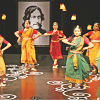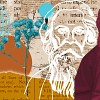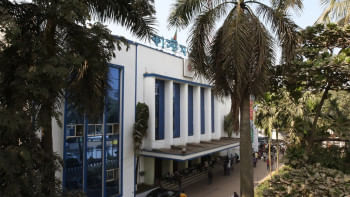You have made me endless...

When Pochishe Baishakh (Baishakh 25), Rabindranath Tagore's birthday, comes, I feel a deep urge to acknowledge his all-pervading spiritual presence in my life. However, it's difficult to express in words my feelings for someone who has been the nucleus of my core beliefs since childhood. There is one way to chronicle the progression of my relationship with Rabindranath Tagore—through his songs, a terrain I can traverse with some degree of ease and familiarity. This column, therefore, is not an essay on Tagore's literary contributions or a critique of his impact on the Bangalee psyche. I concede with humility that there are numerous scholars and authors who are better equipped to write a critical analysis of his writings. Hence, this is an intimate narrative, tracing the evolution of my persona through Tagore's songs.
My first awareness of "self" occurred while I was listening to Tagore singer Suchitra Mitra sing, "Kothao amar hariye jawar nei mana monay monay, mele dilem gaaner surer aye daana monay monay" ("There is no bar to losing myself in an imaginary world. I can soar on the wings of a song in my mind)." I was perhaps five years old, but the experience of being drawn into a world where I could spread the wings of imagination and travel to a fairy tale land must have been surreal. My Uncle Jamil Choudhury who took me to this musical "festival," often reminisced about the little girl who sat through the entire rendition with starry-eyed amazement and hummed the song for the next few days. Thus began my "Rabindra Sangeet" journey, culminating in a larger expedition of self-discovery and introspection.
Once the voyage began, every experience took me one more step towards the awakening of the senses through the poet's lyrics and melody. I marvelled at the "accident," which had plunged me into an orbit—the orbit of life which is a divine gift. Observing the world through Tagore's music and poetry, I felt a close bond with the Creator, discovering divinity in nature— a dewdrop, a floating cloud, or a blooming lotus. Like many others who have lived through the Tagorean experience, I learnt to love every moment of my existence with more passion, because I realised that I must never take my life for granted; it is, after all, a bishshoy (wonder) in this mahabishwa (vast universe)!
Before I had the opportunity to live through the ecstasy of love, I experienced it in Tagore's lyrics and music. In her book Rabindranath Tagore: A biography, Krishna Kripalini writes, "If I were asked what was his (Tagore) most dominant quality which might explain all the varied aspects of his personality and genius, I should say that he was first and last and above all else a lover." Tagore's empathetic understanding of the intricacies of the human mind made his love songs exceptionally sensual and sensitive. Added to this was his deep connection with nature. The relationship between nature and man is so masterfully woven in his lyrics that one can feel the monsoon rain or the south wind emote with the same intensity as the human lover.
My Tagorean experience reached its pinnacle in 1971. Turbulent tides of change swept through our country in the late 60s. It impacted the lives of Bangalees in a major way, leading to the creation of a free Bangladesh. Tagore's literary works were an integral part of this patriotic movement. I developed a natural love for Bangla music early in life when I started to take lessons in Rabindra Sangeet in the music school, Chhayanaut, where I was initiated into the fascinating world of Tagore's songs. Like many of my generation, my pride in Bangalee culture and heritage was rooted in Tagore's writings.
When I crossed the border from Bangladesh to India in June 1971, to participate in the Liberation War, unwittingly, I had stepped into a very important crossroad of history and was destined to be a part of a momentous era. I joined a group of Bangladeshi musicians. We walked through the refugee camps of displaced Bangladeshis, singing "Amar Sonar Bangla" to keep the spirit of a free Bangladesh alive for the unfortunate thousands who were demoralised. Part of our mission was also to create awareness about our independence struggle for a "Golden Bengal" among the people of India through a musical narrative.
The forced exile was yet another step towards getting to know the real "Robi Thakur." It took me to his ashram Santiniketan where I met my music gurus—legends Kanika Banerjee and Nilima Sen—and other notable Tagore personalities like Debabrata Biswas. I was but a novice trying to make a modest entry into the Rabindra Sangeet world. What I discovered was that, in the monastic environ of Tagore's ashram, egos had been shed. Hence, an insignificant young girl from a country with only a name, but no territory, was readily accepted into the affectionate fold of his disciples!
Life's voyage took me to other lands and other cultures. However, every time I felt lonely and desolate, I was reconnected to my roots through Tagore. Whether it was teaching "Ami chini go chini tomare, ogo bideshini" ("I know you, Oh, maiden of a distant land") to street children in Yerevan, Armenia, or organising his birthday celebrations in Bucharest, Romania, Tagore provided me with the opportunity to showcase the cultural treasures of my native land and helped me bond with strangers in most unique ways.
Recently, as I was sitting in my home in Virginia, US on a rainy afternoon and humming strands of Rabindra Sangeet, I felt nostalgic about my childhood friends, the monsoons of Bengal, the afternoon tea sessions and idle chit-chats with family, and even the clamour of loud conversations and honking cars in Dhaka. But above all, I missed my music which is no longer in the centre stage of my life, primarily because I am in a setting where Tagore is not part of the mainstream. The thought filled me with a sense of sadness, because "the song that I came to sing remains unsung to this day..."
However, whenever I feel desolate, I am consoled by the lyrics of one of Tagore's Baul numbers, "Amar praner manush ache prane tai heri tai sokol khane" ("The man of my heart, dwells in my heart, which is why I see him everywhere").
I realise how aptly the words express my deep relationship with the poet. Of course, Tagore is and always will be deep within me. Each time I feel that I have lost him, he makes his presence felt by filling up the empty receptacle of my heart with the elixir of life.
Thank you, Gurudev, for making the finite journey of my life an infinite experience!
Note: Translations have been collected from various sources. Some liberties have been taken by the author in paraphrasing Tagore's lyrics.
Milia Ali is a Rabindra Sangeet exponent and a former employee of the World Bank.
Views expressed in this article are the author's own.
Follow The Daily Star Opinion on Facebook for the latest opinions, commentaries and analyses by experts and professionals. To contribute your article or letter to The Daily Star Opinion, see our guidelines for submission.

 For all latest news, follow The Daily Star's Google News channel.
For all latest news, follow The Daily Star's Google News channel. 










Comments